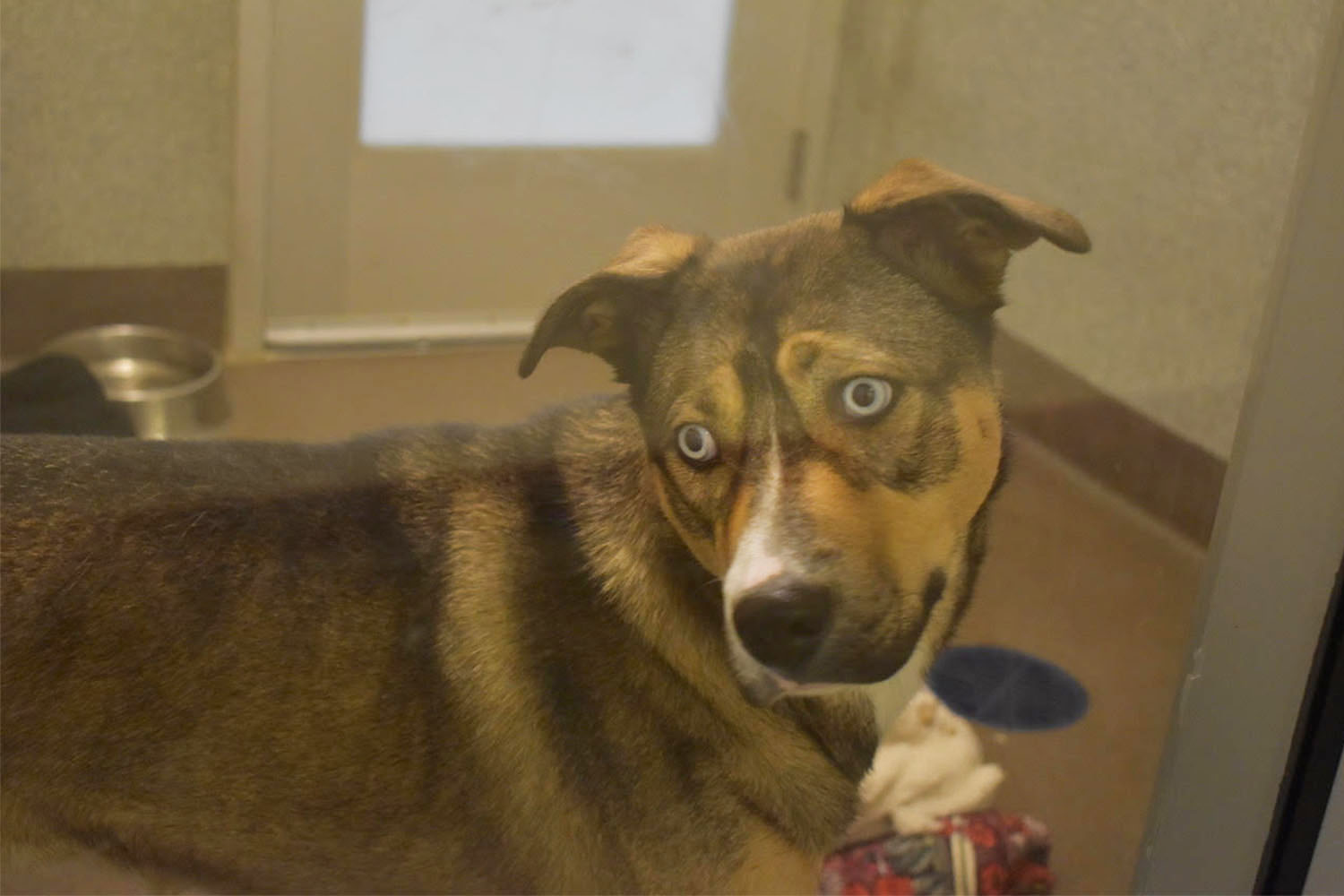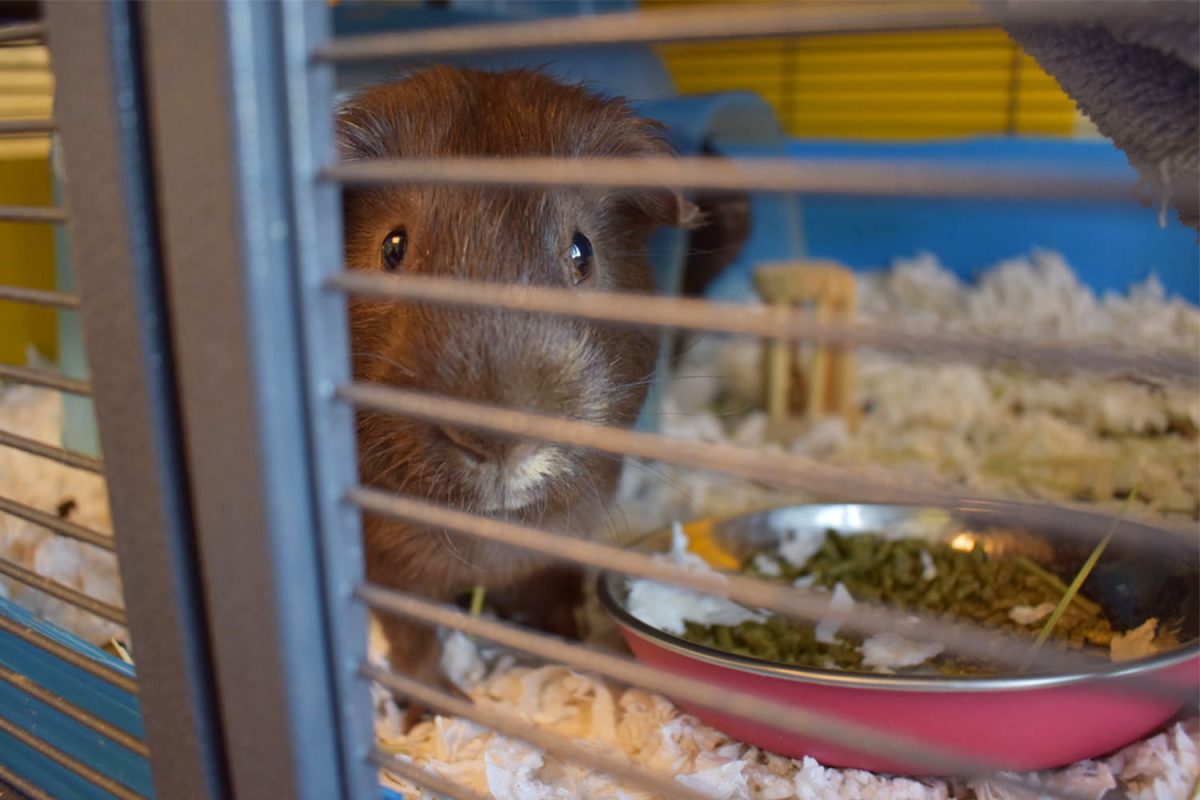Behind glass doors: the ethics of animal shelters

Over two million animals.
That is how many entered United States shelters and rescues in 2023, according to Shelter Animals Count (SAC).
Yet, people still buy their pets from breeders and stores.
Ethical issues have plagued the pet industry for years. People claim pet breeders as cruel for first-hand contributing to the crisis of overpopulation in shelters, as shelters try their best to care for the arrival of so many animals but lack the resources. The ultimate result?
Euthanization.
In 2023, SAC estimates that approximately 800,000 animals will be euthanized in shelters by the end of the year.
In all the shelters and rescues that report to SAC, over 2 million animals entered shelters between the start of 2023 to October.
One shelter is located in Burlingame and is owned by Peninsula Humane Society and SPCA (PHS/SPCA), a nonprofit animal organization.
Through the doors lies an open-spaced room with benches and a counter. Workers and volunteers greet each other with friendly faces as they pass by. Barking can be heard from afar. At the back of the first floor of their facility, you’ll find dogs in small rooms they call “condos.”
Large dogs occupy most of the condos.
“There are a lot of large dogs. That’s pretty common now in shelters across the U.S. It’s hard for people to adopt large animals because you need a bigger space,” said Buffy Martin-Tarbox, the Communications Manager at Peninsula Humane.
Echo, a camera-shy Australian Shepherd cattle mix, is one of the large dogs housed in the condos.
“Echo’s definitely gonna need to go to an active family that’s going to be consistent in taking him out for walks and getting some of his energy out,” Martin-Tarbox said.
When asked how many animals the shelter can house, Martin-Tarbox said it depends on how big the dogs are, for small dogs could be housed in the same room if they get along. At the time of the interview, only two small dogs were in the building— a pug and a chihuahua.
PHS doesn’t have to turn away any dogs who need shelter because they have another shelter in San Mateo. Martin-Tarbox, who has been working at the shelter for almost seven years, said she had never witnessed PHS reject assistance to an animal but acknowledged that it has happened before in their history.
PHS strongly believes in giving all pets a second chance at a forever home. Duke, one of the big dogs at the shelter, has been at the facility for over 300 days.

“We never euthanize a healthy animal,” Martin-Tarbox said.
Ascending to the second floor, adopters can meet small animals, reptiles, and birds.
In the reptile room, guests can find an unusual amount of snakes, specifically ball pythons. According to Martin-Tarbox, all of them were surrendered by their owners, meaning their previous owners brought them to the shelter.
“Sometimes, people pass away, and their family can’t take care of the animal, so they bring them to us. Other times, people lose their pet-friendly housing. Sometimes, a new cat that they just adopted just can not get along with the cat that they had before. Animals are surrendered to us for a variety of reasons,” Martin-Tarbox said.
When PHS receives a lot of animals, they sometimes hold adoption specials to encourage more adoptions. Qualified adopters (those who know how to care for their animals) don’t have to pay for their animals during an adoption special.
Before an animal gets put out for adoption, they are generally tested on their behavior, health checked, and spayed or neutered if they haven’t been already.
PHS wants to ensure that their animals get sent out to good homes, so they are very honest when they think someone won’t be a suitable owner.
“We care for these animals from the beginning when they come to our shelter until they’re adopted. So we want to make sure that they are given the best home possible,” Martin-Tarbox said.
Martin-Tarbox had nothing to say about breeders on behalf of PHS but noted that animals at the shelter are healthier than those in pet stores.
In addition, she declined to comment about the ethics of reputable breeders contributing to overpopulation but said PHS understands if people are interested in a different breed.
Yet, she also said PHS agrees with the motto “adopt, don’t shop.”
Peninsula Humane Society is a shelter in a relatively good position. Martin-Tarbox said that their “euthanasia rates are relatively low for being an open-door shelter.”
A look into Pound Puppy Rescue (PPR) will help people understand more about the problem of overpopulation in shelters.
PPR begins with the founder, Kathleen O’Sullivan, who encountered an animal control officer transferring a box of puppies to be euthanized.
“He was going to take this box of ten gorgeous, perfect little puppies and kill them. That was the first time Kathleen realized that this was happening every day in shelters all over the place,” said Indrani Stangl, a volunteer at PPR for almost 20 years.
Stangl takes puppies out of shelters, even those with diseases or injuries, and assigns them to a foster home that can care for them while they wait to be adopted.

But they can’t save every puppy in need.
“I get a lot of emails and calls and texts from shelters saying, ‘Look at these gorgeous puppies, they’re at the pound. Can you help?’ Then, I’ll email my foster families and see if someone can help. Sometimes they can’t, and I’ll just have to say no, which is horrible,” Stangl said.
PPR’s opinion is straightforward when asked about puppy mills that breed commercially.
“Usually, the momma dogs are bred and bred and bred until they’re just tossed away, or they die. Basically, puppy mills don’t think of dogs as sentient beings with feelings, and they use them as products just for profit,” Stangl said.
Stangl mentioned how the rise of the internet fuels the problem because mills can post pictures of healthy puppies and hide realities within.
“I wish the government would crack down on them because shelters are being overrun with dogs and puppies that are being euthanized every week. It just seems terrible that these people can just be selling puppies for thousands of dollars,” Stangl said.
Like Martin-Tarbox, Stangl has mixed opinions on the practice of reputable breeding. She believes it’s challenging to find a reputable breeder, and the breeder needs to be willing to go through the process of ensuring that the pet is safe with their new owner and answer any questions the adopters have.
“I actually went to a purebred dog show for my own education. I talked to a lot of handlers and breeders and the people at the dog show were actually very ethical. So there’s something to be said about keeping the breed alive,” Stangl said.
Stangl expanded on her point about specific breeds, saying a good breeder would maintain the breed’s features while non-reputable breeders would lie about the dogs they are breeding.
“People know how terrible the shelter situation is right now. And they’re still going to the breeder. I know it is never going to go away, so I feel there should be more oversight,” Stangl said.
According to Stangl, a big part of the problem that works hand in hand with puppy mills and unreputable breeding is the lack of spaying and neutering animals.
“Every other day, I get an email saying, ‘Oops, my dog got pregnant,’” Stangl said.
Stangl talked about how people keep bringing puppies from their homes or the streets to shelters in the Fresno area where PPR rescues puppies.
“If dogs were spayed and neutered, this just wouldn’t happen,” Stangl said.
Joseph Bender and his wife, Crystal, run Divinus Pride Bengals, a cattery that breeds Bengal cats.
“The Bengal cat is a wildcat hybrid, and they are bred with a cat called the Asian leopard cat, referred to as the ALC. One of the traits that passed through from the ALC that makes it very unique is its affinity for water,” Bender said.

Bender explained how their love for the breed sprouted when they met their friend’s Bengal cat. They went on to get their first cat, Zeus, having no intentions of breeding. As Zeus grew bigger and stronger, Bender and his wife reminisced the memories of the little kitten they once had.
That’s when they decided to start breeding cats.
“Crystal was already working at a veterinarian’s office. So she’s getting a lot of skills, firsthand knowledge, working with animals, and lots of information that she was able to soak up while she worked there. And so when we decided to do breeding, it was like, wow, this is perfect because we were totally prepared for it,” Bender said.
Joseph and Crystal Bender are very knowledgeable about the world of breeding animals. Crystal Bender worked as a veterinarian assistant in the past. The couple is registered with The International Cat Association (TICA), proving they are reputable breeders, and they take numerous precautions to ensure that all the cats in their care are healthy and happy.
“Before we even mate them, we are always monitoring their well-being. We do this through a variety of ways. First of all, we get a baseline health understanding of all of our breeding cats. We go through a thorough testing regimen with that cat for hereditary genetic issues going forward,” Bender said.
He went on to inform about their safety procedures, such as separating the male and female cats if the female, also known as a “queen,” needs a break or is uncomfortable. In addition, they monitor the queen’s weight and well-being after the mating is over and give her a quiet space to give birth. He believes breeding healthy cats is especially important if breeders want to avoid future problems.
“When the litter comes, it’s like glory in the house,” Bender said. “We have new energy; new souls have arrived. You know, it’s just a blessing.”
He said he enjoys the surprises the kittens bring to the house and enjoys scavenger hunting for all the kittens after they’ve been roaming around for some time.
After discussing the joys of raising Bengal cats, Bender was posed with the controversial questions surrounding breeding.
“I do see the side of it where we’re kind of doing something a little unnecessary, because if the goal of the person that wants to have a new pet or a new companion in their family is to just have a new companion, then it makes sense. Shelters provide that and more,” Bender said. “But there are also some people that appreciate the uniqueness that specific breeds carry and find that those unique traits are very desirable.”
Bender’s reasoning seemed to reflect well why people may turn to breeders and why people breed pets in the first place.
“They’re looking for a very specific type of animal that is going to give them the lifestyle that is fitting what they want. If we’re not doing it, somebody’s going to do it. And I know if we do it, at least we will do it very ethically,” Bender said.
People for the Ethical Treatment of Animals (PETA) is an animal organization that aims to help animals and fight against animal abuse.
“PETA operates under the simple principle that animals are not ours to eat, wear, experiment on, use for entertainment, or exploit in any way,” said Reilly Park, a Student Action Organizer and Speaker at PETA.
Unlike the shelter and the rescue, PETA completely opposes the practice of breeding animals.
“However well-intentioned they may be, they contribute to the severe companion animal overpopulation crisis. Every newborn animal purchased from a breeder leaves one fewer home for another animal who is desperately waiting in a shelter or roaming the streets,” Park said.
One thing all the organizations can agree on is that a lack of spaying and neutering causes shelter overpopulation.
“Many shelters are full due to the companion animal overpopulation crisis. This is because people keep breeding animals and are not spaying and neutering them,” Park said.
Although adopters ultimately get to choose where they get their animals, PETA’s advice stands strong.
“For people who have the time, money, love, and patience to make a life-long commitment to an animal, we strongly encourage adoption from shelters or rescue groups rather than buying from pet stores or breeders,” Park said.
PETA argues that “countless puppies are born every day, thanks to breeders,” thus contributing to overpopulation.
However, the nation’s leading dog breed registry, the American Kennel Club (AKC), argues that “responsible breeders do not contribute to the situation of homeless pets in shelters” because good breeders take great care of their pets and where they end up.
Many opinions lie in the murky middle.
“A lot of those sheltered animals are coming from these mills. When somebody who is not qualified to really take care of an animal goes in and gets a very cheap animal, that’s a very low investment. They have no interest,” Bender said. “So they often just end up on the streets or in a backyard until they run away because they’re being completely neglected. If there was less of that, then I believe there would be less of a problem with what ethical breeders are doing.”
This is reflected in the Peninsula Humane Society shelter, where Martin-Tarbox explained how many of their animals came in as surrenders or strays.
Peninsula Humane Society and Pound Puppy Rescue also point to the fact that sometimes, people want a specific animal, and that’s expected.
“I’ve pretty much come to terms with the fact that breeders are not going to go away,” Stangl said. “So since it’s going to be happening, I think we need more oversight to make sure it’s ethical, and the dogs are healthy, treated well, and they care where the dogs are going, and it’s not just about the money.”





Teah • Mar 8, 2024 at 3:33 pm
This is a great article! I appreciate hearing arguments from both shelters and breeders. Very well done